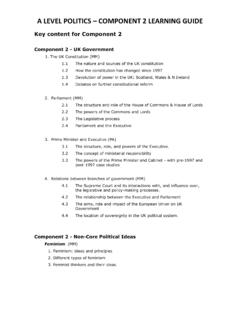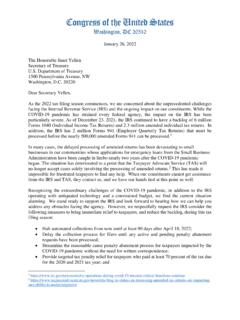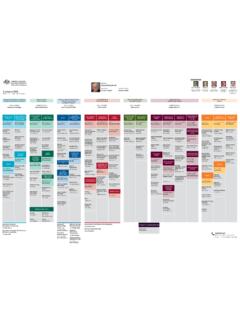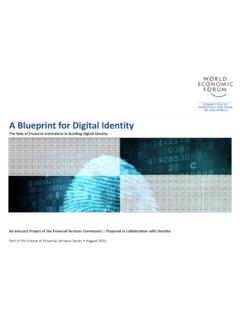Transcription of The Efficient Markets Hypothesis
1 Markets Hypothesis /Clarke 1 The Efficient Markets Hypothesis Jonathan Clarke, Tomas Jandik, Gershon Mandelker The Efficient Markets Hypothesis (EMH), popularly known as the Random Walk Theory, is the proposition that current stock prices fully reflect available information about the value of the firm, and there is no way to earn excess profits, (more than the market over all), by using this information. It deals with one of the most fundamental and exciting issues in finance why prices change in security Markets and how those changes take place. It has very important implications for investors as well as for financial managers. The first time the term " Efficient market " was in a 1965 paper by Fama who said that in an Efficient market , on the average, competition will cause the full effects of new information on intrinsic values to be reflected "instantaneously" in actual prices.
2 Many investors try to identify securities that are undervalued, and are expected to increase in value in the future, and particularly those that will increase more than others. Many investors, including investment managers, believe that they can select securities that will outperform the market . They use a variety of forecasting and valuation techniques to aid them in their investment decisions. Obviously, any edge that an investor possesses can be translated into substantial profits. If a manager of a mutual fund with $10 billion in assets can increase the fund s return, after transaction costs, by 1/10th of 1 percent, this would result in a $10 million gain. The EMH asserts that none of Markets Hypothesis /Clarke 2 these techniques are effective ( , the advantage gained does not exceed the transaction and research costs incurred), and therefore no one can predictably outperform the market .
3 Arguably, no other theory in economics or finance generates more passionate discussion between its challengers and proponents. For example, noted Harvard financial economist Michael Jensen writes there is no other proposition in economics which has more solid empirical evidence supporting it than the Efficient market Hypothesis , while investment maven peter lynch claims Efficient Markets ? That s a bunch of junk, crazy stuff (Fortune, April 1995).1 The Efficient Markets Hypothesis (EMH) suggests that profiting from predicting price movements is very difficult and unlikely. The main engine behind price changes is the arrival of new information. A market is said to be Efficient if prices adjust quickly and, on average, without bias, to new information.
4 As a result, the current prices of securities reflect all available information at any given point in time. Consequently, there is no reason to believe that prices are too high or too low. Security prices adjust before an investor has time to trade on and profit from a new a piece of information. The key reason for the existence of an Efficient market is the intense competition among investors to profit from any new information. The ability to identify over- and under-priced stocks is very valuable (it would allow investors to buy some stocks for less than their true value and sell others for more than they were worth). Consequently, many people spend a significant amount of time and resources in an effort to detect " Markets Hypothesis /Clarke 3 priced" stocks.
5 Naturally, as more and more analysts compete against each other in their effort to take advantage of over- and under-valued securities, the likelihood of being able to find and exploit such mis-priced securities becomes smaller and smaller. In equilibrium, only a relatively small number of analysts will be able to profit from the detection of mis-priced securities, mostly by chance. For the vast majority of investors, the information analysis payoff would likely not outweigh the transaction costs. The most crucial implication of the EMH can be put in the form of a slogan: Trust market prices! At any point in time, prices of securities in Efficient Markets reflect all known information available to investors. There is no room for fooling investors, and as a result, all investments in Efficient Markets are fairly priced, on average investors get exactly what they pay for.
6 Fair pricing of all securities does not mean that they will all perform similarly, or that even the likelihood of rising or falling in price is the same for all securities. According to capital Markets theory, the expected return from a security is primarily a function of its risk. The price of the security reflects the present value of its expected future cash flows, which incorporates many factors such as volatility, liquidity, and risk of bankruptcy. 1 M. Jensen, Some Anomalous Evidence Regarding market Efficiency, Journal of Financial Economics (June /Sept. 1978).
7 Markets Hypothesis /Clarke 4 However, while prices are rationally based, changes in prices are expected to be random and unpredictable, because new information, by its very nature, is unpredictable. Therefore stock prices are said to follow a random walk. 2 THREE VERSIONS OF THE Efficient Markets Hypothesis The Efficient Markets Hypothesis predicts that market prices should incorporate all available information at any point in time. There are, however, different kinds of information that influence security values. Consequently, financial researchers distinguish among three versions of the Efficient Markets Hypothesis , depending on what is meant by the term all available information . Weak Form Efficiency The weak form of the efficienct Markets Hypothesis asserts that the current price fully incorporates information contained in the past history of prices only.
8 That is, nobody can detect mis-priced securities and beat the market by analyzing past prices. The weak form of the Hypothesis got its name for a reason security prices are arguably the most public as well as the most easily available pieces of information. Thus, one should not be able to profit from using something that everybody else knows . On the other hand, many financial analysts attempt to generate profits by studying exactly what this Hypothesis asserts is of no value - past stock price series and trading volume data. This technique is called technical analysis. 2 Interestingly, in his book A Random Walk Down Wall Street, Burton Malkiel notes: On Wall Street, the term random walk is an obscenity.
9 It is an epithet coined by the academic world and hurled insultingly at the professional soothsayers. Markets Hypothesis /Clarke 5 The empirical evidence for this form of market efficiency, and therefore against the value of technical analysis, is pretty strong and quite consistent. After taking into account transaction costs of analyzing and of trading securities it is very difficult to make money on publicly available information such as the past sequence of stock prices. Semi-strong Form Efficiency The semi-strong-form of market efficiency Hypothesis suggests that the current price fully incorporates all publicly available information. Public information includes not only past prices, but also data reported in a company s financial statements (annual reports, income statements, filings for the Security and Exchange Commission, etc.)
10 , earnings and dividend announcements, announced merger plans, the financial situation of company s competitors, expectations regarding macroeconomic factors (such as inflation, unemployment), etc. In fact, the public information does not even have to be of a strictly financial nature. For example, for the analysis of pharmaceutical companies, the relevant public information may include the current (published) state of research in pain-relieving The assertion behind semi-strong market efficiency is still that one should not be able to profit using something that everybody else knows (the information is public). Nevertheless, this assumption is far stronger than that of weak-form efficiency. Semi-strong efficiency of Markets requires the existence of market analysts who are not only financial economists able to comprehend implications of vast financial information, but 3 One should not be surprised that investment companies analyzing many of the high-tech industries have started employing experts from many non-financial areas (such as medical doctors, pharmacists, biochemists, etc.)






